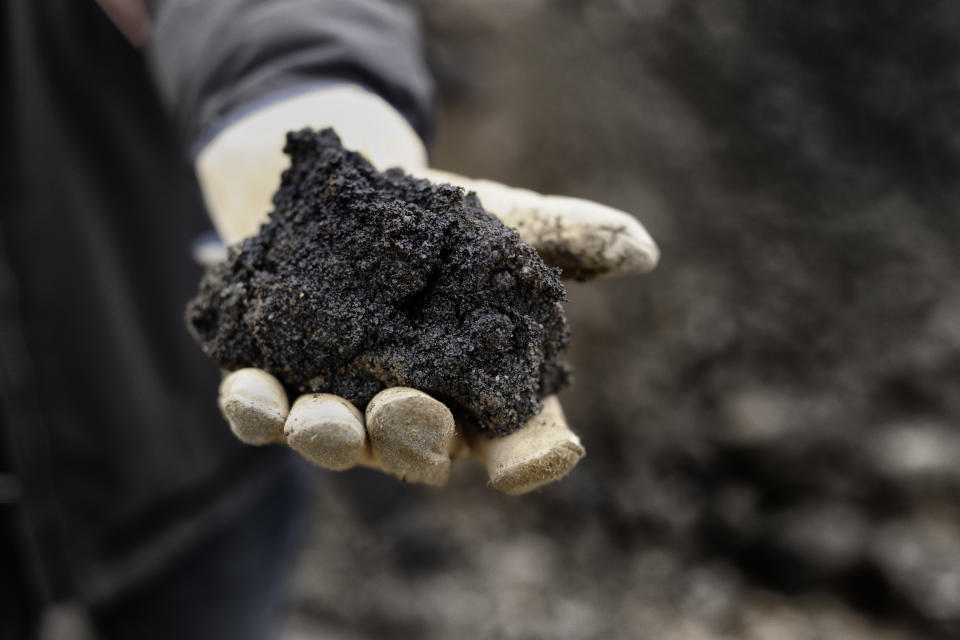Trudeau announces $2.45B in aid for oil and gas sector, $1.7B to clean up wells

Prime Minister Justin Trudeau has announced new aid for Canada’s battered oil and gas sector, responding to pleas for help as commodity prices fell to record lows and demand disappeared due to COVID-19.
Speaking at his daily news briefing in front of Rideau Cottage, Trudeau said Ottawa would spend $1.7 billion on cleaning up abandoned oil and gas wells in Alberta, Saskatchewan and British Columbia. He also announced a $750 million Emission Reductions Fund, including $75 million to help the offshore oil industry.
The measures are expected to help the sector maintain roughly 10,000 jobs across the country.
“Right now, workers and families are struggling because of things beyond their control. Both the devastating effects of the pandemic and the price war driven by foreign oil interests. As a result, companies have had to slow down or pause their operations, leaving many people out of work,” Trudeau said on Friday.
“Our goal is to create immediate jobs in these provinces, while helping companies avoid bankruptcy, and supporting our environmental targets.”
The energy industry-funded Orphan Well Association estimates there are nearly 3,000 orphaned wells in Alberta as of April 15. The wells are themselves a product of the dramatic downturn the Canadian energy sector has suffered in recent years.
“These wells, which are no longer in use, can be detrimental not only to our environment, but to people’s health,” Trudeau said. “Think of the farmer who can’t grow anything on his land because of an abandoned well a few steps away from her home.”
Trudeau said the Emission Reductions Fund will focus on reducing the methane output across Canada's energy industry, including on offshore rigs in Newfoundland and Labrador.
“This fund will provide primarily repayable contributions to firms to make them more competitive, reduce waste and pollution, and most importantly, protect jobs,” Trudeau said. “Right now, many energy firms are experiencing a cash crunch, so they do not have the funds to invest in technologies to reduce emissions or fix methane leaks.”
Trudeau said the government is also working with Export Development Canada and Business Development Canada to expand credit support for at risk medium-sized energy country companies, so they can maintain operations and keep their employees.
Asked if the oil and gas support measures announced on Friday will constitute the entirety of the government’s response, Trudeau pointed to previously announced measures to support individual workers and businesses at large. He added that Ottawa continues to look at ways to support important industries, including oil and gas.
Rank and file oil and gas workers, C-suite executives, and scores of Canadians employed by businesses that rely on a functioning energy industry have held their breath since late March, when Finance Minister Bill Morneau said a plan would be unveiled in “hours, potentially days.”
Companies in Canada’s energy patch have been bombarded by the dual shock of constricted global demand due to COVID-19, and the threat of a flood of cheap foreign crude as a result of the Saudi-Russian price war.
Rachel Ziemba, founder of Ziemba Insights, said the Prime Minister found a “smart way to thread the needle between environmental goals, energy sector liabilities, and employment needs.”
“I doubt the oil patch will be very happy,” she added. “They hoped it would lead to major support or carbon tax abatement. But this it’s a good way to increase technology and make elements of the Canadian energy sector more competitive in a world that is not going to forget about decarbonization, despite the crisis.”
In a letter revealed in news reports on Friday, Canadian Association of Petroleum Producers CEO Tim McMillan asked Trudeau and other government ministers to relax environment regulation and freeze the carbon tax while the industry weathers the storm of COVID-19.
Asked about the letter, Trudeau responded by saying, “Just because we’re in a health crisis, doesn’t mean we can neglect the environmental crisis.”
Rory Johnston, managing director and market economist at Price Street, called the new measures announced on Friday “a good support effort in the face of extremely negative global conditions.”
“These programs are far from a complete offset, and the Canadian oil patch needs prices to rebound in order to avoid further production shut-ins,” he said.
Canada’s oil and gas sector has laid off workers, halted operations, slashed spending, and shut in production. Alberta’s benchmark heavy oil, Western Canadian Select, plunged to a record low below US$3 per barrel earlier this week as it was dragged down by the worldwide oil slump.
The spat between the energy powers Saudi Arabia and Russia began at the March 5 OPEC+ meeting in Vienna. Russia balked at a plan to restrain production to stabilize the global crude market in response to COVID-19. Saudi Arabia responded by slashing its official selling prices for April to between US$6 and US$8 per barrel. OPEC+ responded last week with a 9.7 million barrels per day production cut for May and June that would wind down before ending in 2022.
Jeff Lagerquist is a senior reporter at Yahoo Finance Canada. Follow him on Twitter @jefflagerquist.
Download the Yahoo Finance app, available for Apple and Android.

 Yahoo Finance
Yahoo Finance 
